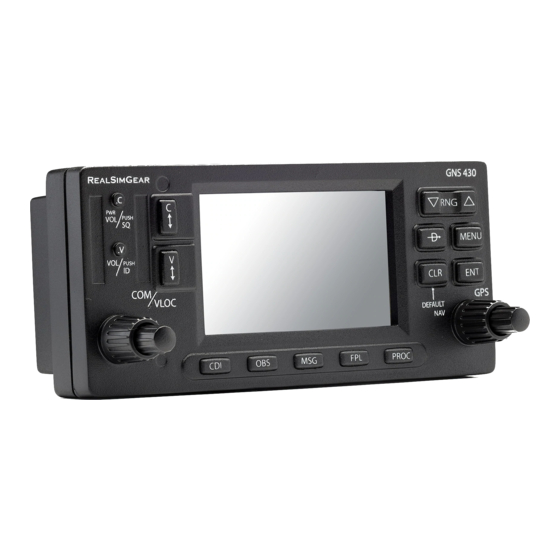FLYING AN APPROACH
TO ACTIVATE THE APPROACH WITH
VECTORS TO FINAL
1)
With an approach loaded in the active flight
plan, press the PROC Key to display the
Procedures Page.
2)
Turn the large right knob to highlight 'Activate
Vector-To-Final?' and press the ENT Key.
GUIDELINES FOR FLYING AN APPROACH
Due to the variety of available approach procedures,
the specific steps required will vary according to the
approach selected. Keep the following general guidelines
in mind while flying the approach:
• The pilot will typically select the destination airport
as the last waypoint in the active flight plan or
using the Direct-to Key. Doing so ensures that
the desired waypoint will automatically appear
when choosing the 'Select Approach?' option from
the Procedures Page. (Otherwise, first choose the
airport, then the approach procedure.)
• When a localizer-based approach (such as an ILS)
is loaded, the desired frequency is automatically
placed in standby on the VLOC window. To
activate the frequency, press the VLOC Flip-flop
Key.
20
• If the VLOC receiver will be used for the approach,
be sure to switch the external CDI (or HSI) to
'VLOC' by pressing the CDI Key ('VLOC' will
appear directly above the CDI Key; see page 15).
• An 'Auto ILS CDI' setting provides automatic
switching to 'VLOC' once established inbound on
the final course segment of an approach.
• As the aircraft progresses to each approach
waypoint, a waypoint alert message ('NEXT DTK
# # #º') will appear in the lower right corner of
the display (see page 15).
• When the pilot should begin a course change (via a
standard rate turn), turn advisories ('TURN TO #
# #º') will appear in the lower right corner of the
display (see page 15).
• For GPS-based approaches, receiver autonomous
integrity monitoring (RAIM) will monitor
satellite conditions and alert the pilot using
an 'INTEG' or 'WARN' annunciation at the
bottom left corner of the display (see page 15)
if protection limits cannot be maintained. If
this occurs, the GPS receiver should not be used
for primary navigation guidance. Revert to an
alternate navigation source, or select an alternate
destination airport.
• Within 30 nautical miles of the destination airport,
CDI scaling will transition from 5.0 nautical
miles (enroute mode, 'ENR') to 1.0 nautical mile
(terminal mode, 'TERM') or when leaving the
departure airport, from 1.0 nm to 5.0 nm. Within
2.0 nautical miles of the final approach fix, GPS-
based approaches will see a second transition from
1.0 nautical mile to 0.3 nautical mile (approach
mode, 'APR').
GNS 430 Quick Reference

